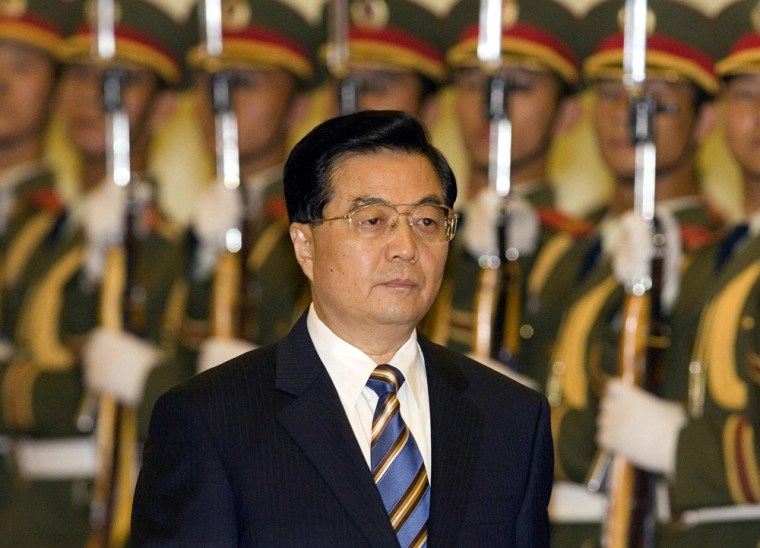BEIJING — The autumn blue skies above Beijing lend an air of calm to this capital city. They are deceiving, though — in the halls of power things are very stormy.
The most visible part of this turmoil came in recent days when China's President Hu Jintao instigated the abrupt dismissal of Chen Liangyu, the Communist Party leader in Shanghai, who was put under house arrest due to his involvement in a huge corruption scandal.
It also came as Hu prepares to lead the considerable pomp and ceremony on Sunday that will mark the 57th anniversary of the communist party victory and the founding of the People’s Republic of China.
Chen, also a member of the elite Politburo, belongs to the so-called Shanghai Gang linked to former president Jiang Zemin, which is considered a roadblock to Hu's consolidation of power.
The move is widely seen as a sign that Hu is flexing his growing political muscle by eliminating rivals within the party in the run-up to the all-important 17th Party Congress, scheduled for this time next year, where Hu will attempt to establish his undisputed control.
However, there are those analysts, such as Beijing-based scholar Russell Leigh Moses, who do not subscribe to the theory that Chen's arrest marks Hu's final consolidation of power in Beijing.
Instead, Moses — the only American professor teaching politics full-time in a Beijing university — sees recent political turbulence and policy changes in China as a sign of just how threatened the Hu administration currently feels.
"The Hu Jintao administration perceives political threat from internal rivals and from external forces the Party cannot control," said Moses. "And although rarely mentioned, last week's military coup in Thailand has had a profound effect on the Hu administration's recent actions."
"In China, arresting officials like Chen is like giving out speeding tickets at a Formula 1 race," said Moses. "Hu is fighting the Shanghai Gang, but he doesn't have the political power to really change the status quo. If he did, he would certainly use it."
Internal battles
The struggles between the Shanghai Gang, whose most prominent member was former President Jiang Zaimen and others in the party have been going on for many years — and against the background of considerable social turmoil as the Chinese economy has been opened to market forces.
And even when Hu, who took over as president in 2002, managed to force Jiang to step down from his last official position within the party as chairman of the Central Military Commission in 2004, that move did not put an end to the political battle between the two factions.
"In the two years since assuming power, Hu and Premier Wen Jiabao have moved quickly to promote the ‘Harmonious Society’ campaign in place of Jiang's 'Three Represents,'" said Moses. "At this point Jiang does not feel he is being paid the proper homage by his successor."
As in many past ideological campaigns, innocuous-sounding slogans actually portend bitter inner-party disputes. The "Harmonious Society" campaign not only represents a drastic change in party policy — from a focus on absolute economic growth led by the entrepreneurial class to a more controlled socially equitable growth that benefits the larger masses — but is also a threat to Jiang's ideological legacy.
A loss of control
In part, the tensions have been caused by the two decades in which the Communist Party has relied on explosive economic growth to retain the legitimacy of a one-party system. In order to make this work, howeveer, the party has been forced to concede political control to local authorities, including the recently deposed Chen.
Some analysts believe this steady dilution of political power from the center to local officials and the market has created paranoia among the Chinese leadership that the party's ability to effectively maintain one-party rule is rapidly eroding.
"Whoever it is, no matter how high their positions are, anyone who violates party rules or national law will be severely investigated and punished," the CPC Central Committee said in the press release after Chen's arrest.
Recently, it has been widely reported that new regulations and taxes are being implemented by the Chinese government to reign in foreign investment and real-estate speculations.
More media control also appears on the horizon. Xinhua, China's state-owned news agency, is in the process of gaining control over the release and distribution of all financial and other information by foreign news agencies to Chinese subscribers.
Even major foreign corporations such as Citigroup and Carlyle are encountering resistance to major mergers and acquisitions from Chinese authorities, while Wal-Mart has also acquiesced to Beijing's demand to allow the formation of communist-controlled trade unions in its Chinese stores.
Thailand coup
If these challenges weren't pressing enough, last week's coup in Thailand has given Hu's administration a sudden sense of political urgency.
Like China, Thailand has been opening to outside investment and finances but has also developed a corruption problem due to the strong relationship between public and private interests within the ruling elite. Furthermore, the coup took the Chinese intelligence community by surprise, say analysts.
"This scares the Chinese leadership to the Nth degree," said Moses.
This may help explain Hu Jintao's multiple appearances with military personnel this week, during which he was dressed in his rarely-used green uniform.
